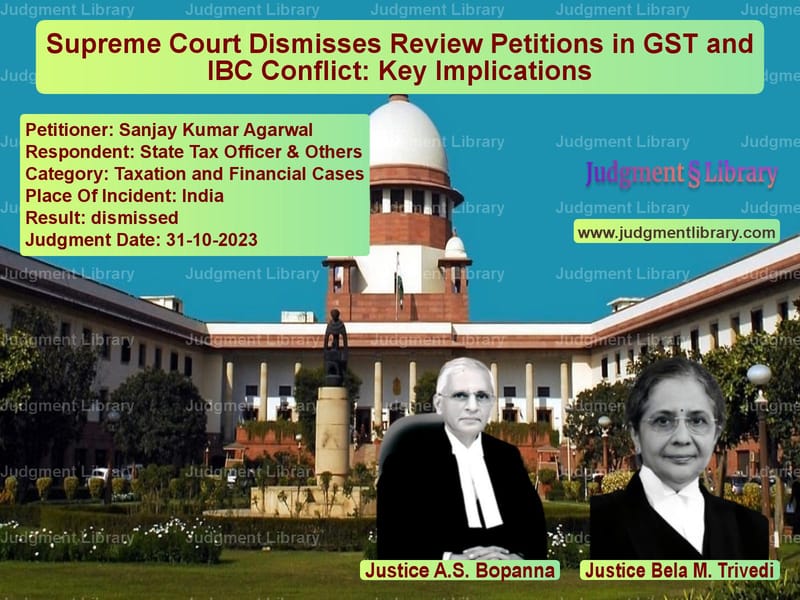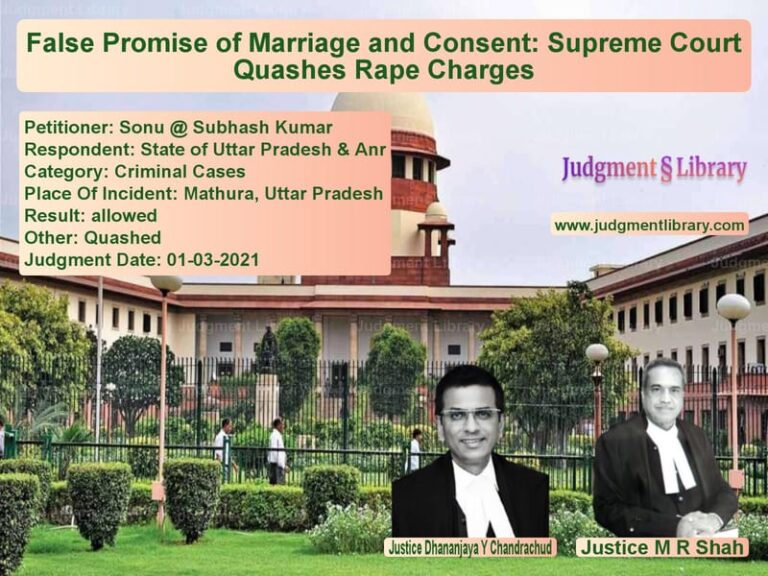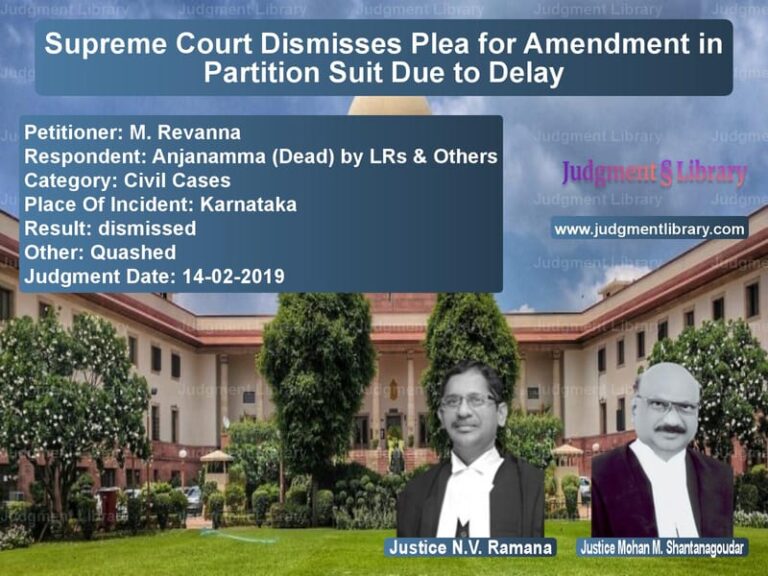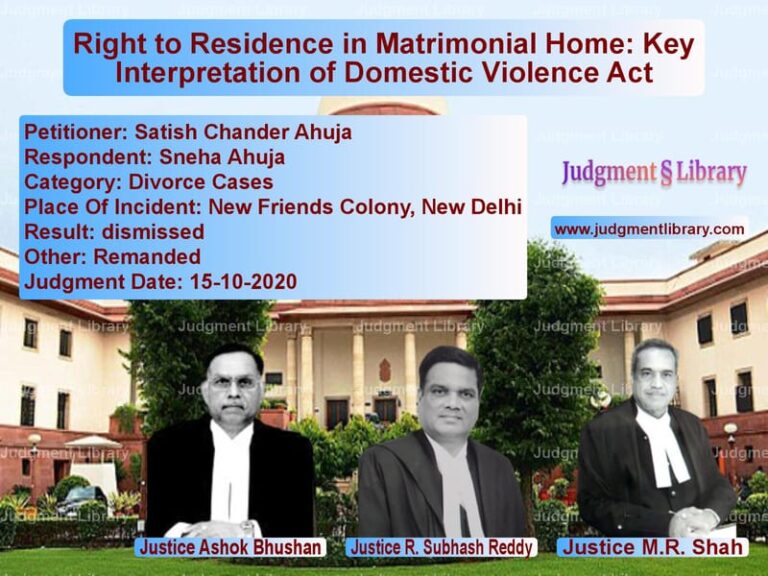Supreme Court Dismisses Review Petitions in GST and IBC Conflict: Key Implications
The Supreme Court of India recently delivered a crucial verdict in the case of Sanjay Kumar Agarwal v. State Tax Officer & Others, along with a batch of related review petitions. The case revolved around the interplay between the Gujarat Value Added Tax (GVAT) Act and the Insolvency and Bankruptcy Code (IBC), 2016, particularly concerning the priority of government tax dues in insolvency proceedings.
The petitioners, including State Bank of India (SBI), Indian Overseas Bank (IOB), and various resolution professionals, sought a review of the Court’s September 6, 2022 judgment, which had ruled that the state tax department’s dues take precedence over unsecured creditors under the IBC framework. The Supreme Court dismissed the review petitions, reinforcing its previous ruling and establishing critical precedents in taxation and insolvency law.
Background of the Case
The review petitions stem from the Supreme Court’s 2022 ruling in State Tax Officer v. Rainbow Papers Ltd., where it was held that state tax dues constitute secured debt under the GVAT Act and must be included in the resolution process. This decision directly impacted the waterfall mechanism under Section 53 of the IBC, which prioritizes payments to secured creditors, workmen, and operational creditors before tax dues.
Following the verdict, multiple stakeholders, including financial institutions and insolvency professionals, filed review petitions challenging the ruling. They argued that it undermined the IBC’s core objective—ensuring a timely and efficient insolvency resolution process while balancing the rights of all stakeholders.
Arguments by the Petitioners
The petitioners made several key arguments:
- Misinterpretation of IBC’s Waterfall Mechanism: They contended that the Supreme Court’s 2022 ruling ignored Section 53 of the IBC, which dictates the order of priority in liquidation. Under this provision, tax dues rank lower than secured and operational creditors.
- Undermining Financial Institutions’ Rights: Banks like SBI and IOB argued that treating tax authorities as secured creditors would devalue financial lending, as banks would be less likely to recover dues from insolvent entities.
- Violation of Legislative Intent: The petitioners highlighted that the IBC was enacted to override conflicting state laws, ensuring a unified insolvency framework. Giving precedence to state tax claims contradicts the IBC’s overriding nature.
- Conflict with Established Precedents: The review petitioners pointed out that the 2022 ruling departed from previous Supreme Court decisions, such as in Ghanashyam Mishra and Sons Private Ltd. v. Edelweiss Asset Reconstruction Company Ltd., which upheld the IBC’s supremacy over state tax laws.
Arguments by the Respondents
The State Tax Officers and other government respondents defended the 2022 ruling, stating:
- State Tax Authorities as Secured Creditors: Under Section 48 of the GVAT Act, the state has a first charge over a company’s assets, which aligns with the definition of a secured creditor under the IBC.
- IBC Does Not Override State Tax Laws: The respondents contended that while the IBC governs insolvency proceedings, it does not nullify state laws regarding tax recovery and secured claims.
- No New Grounds for Review: The respondents argued that a review petition is not an appeal and can only be granted if there is an error apparent on the face of the record. They claimed that the petitioners were merely seeking a reconsideration of an already adjudicated issue.
Supreme Court’s Key Observations
The Supreme Court, after hearing both sides, made the following critical observations:
1. Limited Scope of Review Petitions
The Court reiterated that a review petition cannot serve as an appeal and should only be entertained in cases of a manifest error. It stated:
“A judgment is open to review only if there is a mistake or an error apparent on the face of the record. An error which requires detailed reasoning cannot be considered for review.”
2. Precedence of State Tax Claims
The Supreme Court upheld its previous ruling that under Section 48 of the GVAT Act, state tax authorities hold secured creditor status. This means that their dues must be included in the resolution process and given priority.
Read also: https://judgmentlibrary.com/taxation-treaty-interpretation-and-the-mfn-clause-a-landmark-judgment/
3. No Conflict with IBC’s Waterfall Mechanism
The Court held that Section 53 of the IBC does not explicitly exclude state tax authorities from secured creditor status. It clarified:
“The waterfall mechanism under Section 53 cannot be used to nullify statutory rights conferred under state taxation laws. A secured creditor, as defined under the IBC, includes creditors with charges created by operation of law.”
4. Legislative Intent and Interpretation
The Supreme Court observed that the IBC does not expressly override state tax laws and that both must be harmoniously interpreted.
Supreme Court’s Final Ruling
After reviewing the submissions, the Supreme Court dismissed all the review petitions and reaffirmed its 2022 ruling:
- Review Petitions Dismissed: No error was found in the 2022 ruling, and all review petitions were rejected.
- State Tax Dues Have Priority: The Court confirmed that state tax authorities are secured creditors under the GVAT Act and IBC.
- Legal Precedent Reinforced: The ruling reaffirmed the applicability of state tax laws in insolvency proceedings.
Implications of the Judgment
This judgment has significant ramifications for various stakeholders:
1. Impact on Banks and Financial Institutions
- Banks and lenders will have to re-evaluate their risk exposure when providing loans to businesses, knowing that state tax dues may take priority.
- The ruling could lead to higher interest rates and stricter lending conditions to mitigate potential risks.
2. Challenges for Resolution Professionals
- Resolution professionals handling corporate insolvency resolution processes (CIRP) must now account for state tax dues as secured claims.
- This may complicate resolution plans and increase financial obligations for companies undergoing insolvency.
3. Strengthening State Revenue Claims
- The ruling strengthens the government’s ability to recover tax dues from insolvent entities.
- State tax departments will have a stronger legal standing in ongoing and future insolvency cases.
Conclusion
The Supreme Court’s ruling in Sanjay Kumar Agarwal v. State Tax Officer & Others solidifies the status of state tax authorities as secured creditors in insolvency proceedings. By upholding its 2022 judgment, the Court has reinforced the priority of tax dues in corporate insolvency resolution, impacting financial institutions, corporate debtors, and resolution professionals. This verdict sets a key precedent in balancing the rights of tax authorities and creditors under India’s evolving insolvency framework.
Petitioner Name: Sanjay Kumar Agarwal.Respondent Name: State Tax Officer & Others.Judgment By: Justice A.S. Bopanna, Justice Bela M. Trivedi.Place Of Incident: India.Judgment Date: 31-10-2023.
Don’t miss out on the full details! Download the complete judgment in PDF format below and gain valuable insights instantly!
Download Judgment: sanjay-kumar-agarwal-vs-state-tax-officer-&-supreme-court-of-india-judgment-dated-31-10-2023.pdf
Directly Download Judgment: Directly download this Judgment
See all petitions in Tax Refund Disputes
See all petitions in Banking Regulations
See all petitions in Corporate Compliance
See all petitions in Judgment by A. S. Bopanna
See all petitions in Judgment by Bela M. Trivedi
See all petitions in dismissed
See all petitions in supreme court of India judgments October 2023
See all petitions in 2023 judgments
See all posts in Taxation and Financial Cases Category
See all allowed petitions in Taxation and Financial Cases Category
See all Dismissed petitions in Taxation and Financial Cases Category
See all partially allowed petitions in Taxation and Financial Cases Category







